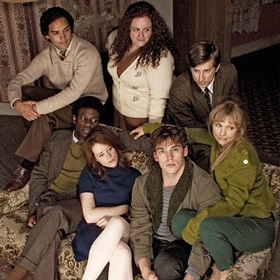White Heat

3.5/5
The BBC’s new six-part series White Heat is Mad Men for the Brits. Well, at least it’s attempting to replicate the Mad Men craze that their neighbors across the Atlantic have clung so passionately to these past few years while still keeping their British flare intact. And instead of New York City’s ad agencies approaching the cultural revolution of a Vietnam-era America, White Heat follows a group of seven flatmates in London’s Tufnell Park. It is set to span several decades, documenting some of the most influential events that comprised the late 20th century. It’s a switch for the Brits to steal a concept from us tadpole American’s (what with shows like The Office and Veep), and just as we Americanized their formats you can expect the contrary Britainization from White Heat.
The show opens in the present day, centering on the adult character of Charlotte (played by Juliet Stevenson), who states in a bleak voiceover: “Someone said that death might end a life, but for the survivor the relationship struggles on, seeking resolution it may never find.” The premise is that one of the main characters died alone in their flat, and went undiscovered for two weeks. The story unfolds this way, revealing itself as hope gone awry. This immediate contrast of the jaded reality of the present placed next to the optimism of youth marks the course for the next hour, and possibly for the duration of the series.
The identity of the individual who has died remains undisclosed as we’re introduced through flashbacks to how these characters originally came to be together: Jack (played by Sam Clafin) rents the rooms of his house out as a social experiment to six undergraduates from different circles in life. Possibly he does this also for the ulterior motive of achieving a commune mentality — proposing everyone abide by the rule that they never sleep with the same person more than three times. Jack is from an aristocratic family who he has uncharacteristically rebelled from (although they still pay him allowance for his exploits). He smokes a lot of weed, doles out psychedelics, and is the epitome of an explosive idealist.
There is obvious sexual tension between Jack and Charlotte (played in her youth by Claire Foy); she’s the naïve and embryonic feminist, while he is the opinionated Marxist-intellectual. The other characters run the gamut to cover all aspects of the social ladder. Lilly (MyAnna Burning) is a quirky blonde who aspires to be a painter; Victor (David Gyasi) is a well-mannered, Jamaican law student; Jay (Reece Ritchie) is an Asian-British med student who is also a closeted homosexual; Orla (Jessica Gunning) is an overweight catholic from Northern Ireland struggling with her family’s poverty; and Alan (Lee Ingleby) is a tech savvy conservative. Regrettably, character subtlety was sorely overlooked, many of them written with such specific intent they border on cliché. The result is any possible personality quirk becomes bogged down by an arching agenda and lacks necessary substance.
Nevertheless, the show’s primary focus is the progress of the women’s movement and more acutely their sexual revolution. Writer and creator Paula Milne (I Dreamed of Africa) explained this is somewhat due to its autobiographical nature, adding: “what women went through in the 60s was seismic.” The title, White Heat, being in itself a term coined by Lord Harold Wilson, a British Labor politician and Leader of the Labor Party, in a speech regarding the world’s technological future. The underlining basis of the show, and maybe the most important character, is the politics — and even further at the core, the society that is fraught with an impending social revolution amidst the slow, public reveal of the seedy underbelly of its government.
White Heat, episode two — “Eve of Destruction,” will air Wednesday, May 15 at 10PM on BBC America.
RELATED ARTICLES
Get the most-revealing celebrity conversations with the uInterview podcast!







Leave a comment